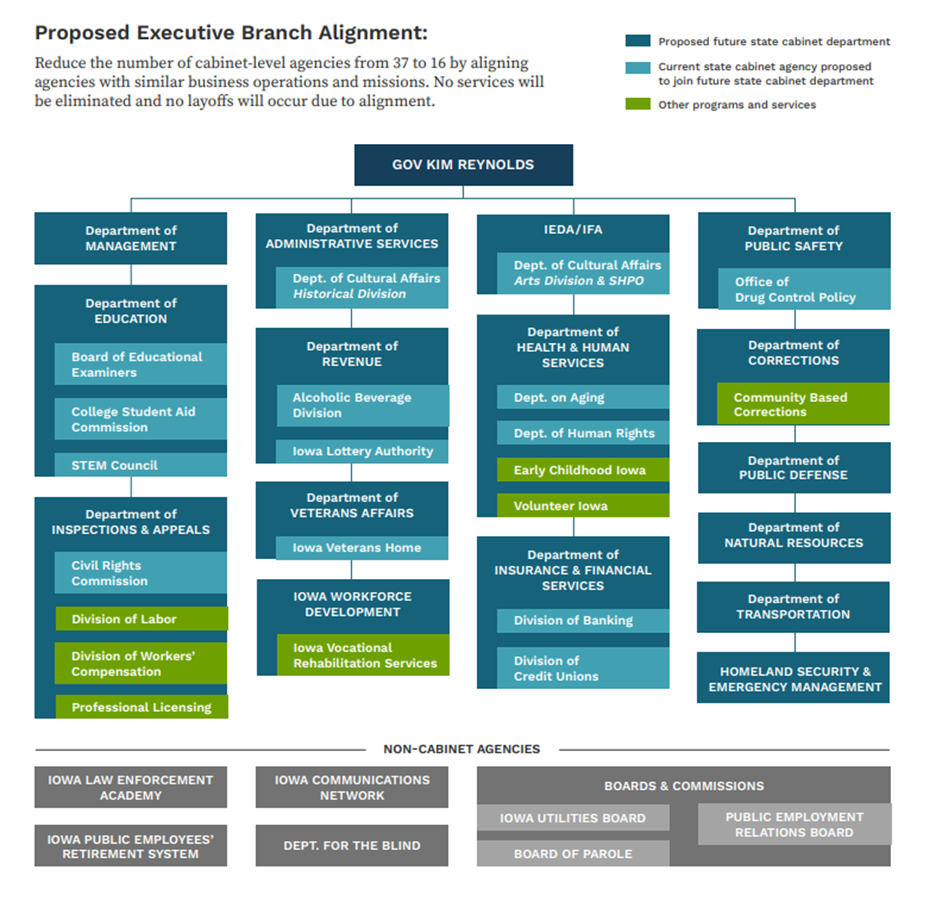On Thursday, Iowans had the opportunity to provide input on the recommendations the Boards and Commissions Review Committee (BCRC) released last week. Out of 256 current boards and commissions, the BCRC recommends that 52 are consolidated, 47 are reorganized, 69 are eliminated, and 88 continue with no changes.
The BCRC is composed of 10 members:
- Kraig Paulsen – Director of the Department of Management
- Jacob Nicholson – Chief Operating Officer of the Iowa Governor’s Office
- Nate Ristow – Administrative Rules Coordinator
- Larry Johnson – Director of the Department of Inspections, Appeals, and Licensing
- David Faith – Deputy Attorney General at the Office of the Attorney General of Iowa
- Barbara Sloniker – Public member appointed by the Governor
- Ex officio, non-voting members:
- Senator Jason Schultz
- Representative Jane Bloomingdale
- Senator Janice Weiner
- Representative Adam Zabner
Public Comment
Speakers represented a wide range of professions at the two-and-a-half-hour meeting, from elevator inspection to midwifery to dentistry. Some comments focused on the proposals to reduce licensing boards for specific professions, while others spoke about consolidations that could diminish the voices of diverse groups.
The BCRC specified that its role is to make recommendations to the Governor and the Iowa legislature. Condensing the number and responsibilities of the boards and commissions in Iowa is part of an effort to drastically reimagine state government, led by Governor Reynolds and the government reorganization law passed this year. See the graphic included below.
BCRC Recommended Changes
The BCRC subcommittees also recommended changes that would remove some of the powers of certain boards and commissions including:
- Removing the Alcoholic Beverages Commission’s rulemaking approval and its authority to reverse the actions of the State Director of Revenue.
- Shifting rulemaking authority from the Iowa Telecommunications and Technology Commission to the Iowa Communications Network (ICN), and having the ICN director be appointed by, and serve at the pleasure of, the Governor.
- Removing policymaking and rulemaking authority from the State Soil Conservation and Water Quality Committee.
- Removing the gender-balanced board requirement.
Members of the public can still submit comments to the BCRC committee through Sunday, September 17 by emailing BCRCcomments@iowa.gov. The subcommittees will review comments through September 20, and the full committee will meet for a final time on September 25 to vote on the final report.
Next Steps
The next step in this process will be for the committee to submit its report with final recommendations to the Governor’s office and the General Assembly no later than September 30, 2023. In order for these recommendations to take effect they will have to be included in legislation that must pass both chambers and be signed into law by the Governor.
The Dentons Davis Brown team will be in contact with the BCRC committee and will stay engaged on behalf of our clients as these recommendations make their way through the process.
Five Key Findings
| FINDING 1 | Iowa’s administrative state will continue to grow without an effective mechanism to review boards and commissions. |
| FINDING 2 | The current organization of advisory boards is neither effective nor efficient. |
| FINDING 3 | Iowa should strive for better public participation in its boards and commissions process. |
| FINDING 4 | Part-time boards and commissions are rarely well-positioned to manage the core functions of executive branch agencies. |
| FINDING 5 | Iowa requires a license or certification for too many occupations, and its standards across all license types are inconsistent, inefficient, and unequal. |
Eight Recommendations
| RECOMMENDATION 1 | Establish an ongoing review process for all boards and commissions, including meaningful enforcement of sunrise and sunset provisions. |
| RECOMMENDATION 2 | Allow more meaningful perspective for public officials by streamlining the structure of advisory boards. |
| RECOMMENDATION 3 | Modernize Iowa’s open meetings laws and expand public participation by more easily allowing virtual or hybrid meeting options. |
| RECOMMENDATION 4 | Allow boards and commissions to convene only as truly needed by removing arbitrary meeting requirements. |
| RECOMMENDATION 5 | Allow the most qualified Iowans to serve on boards and commissions by repealing the arbitrary gender-balance requirement. |
| RECOMMENDATION 6 | Increase engagement on identified critical boards and commissions by compensating members for their “part-time” work. |
| RECOMMENDATION 7 | Clarify the budget and rulemaking roles of a part-time board or commission that oversees a full-time executive branch agency. |
| RECOMMENDATION 8 | Implement clear, consistent, and efficient licensing standards to reduce barriers to entry into the workforce. |


